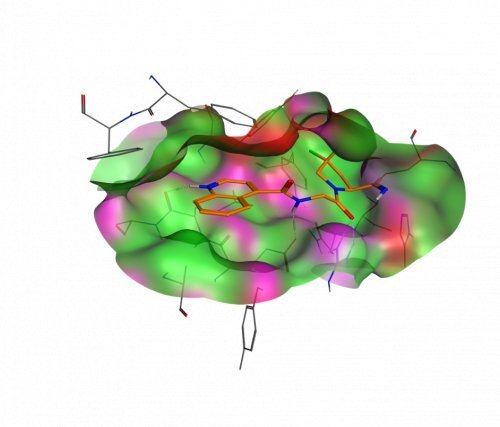Highly selective, orally bioavailable inhibitors of fibroblast activation protein (FAP) with development potential in fibrosis, oncology and pathologic tissue remodeling
The University of Antwerp has discovered the most potent and selective small molecule FAPinhibitors reported to date. Compounds have low nanomolar affinities, are orally bio available and induce stable, long-term in vivo inhibition. Target audience for the technology: pharma/biotechpartners that are looking for a development candidate in oncology and diseases characterized by fibrosis and tissue remodeling.

Situation before
Fibroblast activation protein (FAP) was identified as a serine protease related to the clinically relevant target DPP4. FAP is known to be expressed abundantly on activated fibroblasts, and has been mainly studied in oncology applications focusing on the extracellular matrix. Lately, the enzyme’s role in other diseases involving tissue remodeling, has received strong attention. Finally, research by, a.o., Genentech has recently linked FAP’ senzymatic activity to adverse metabolic events occurring in Type II diabetes. So far, the absence of selective inhibitors has been a critical factor hampering advanced-stage development of FAP inhibitors, leading to concerns of aspecifictoxicity during clinical evaluation. The lead compounds covered by the technology specifically address the shortcomings of earlier FAP inhibitors.
Technology
Lead compound UAMC-1110 is currently the most advanced candidate for further development. UAMC-1110 combines low nanomolar FAP-affinity with high selectivity (SI. > 103) towards all enzymes related to FAP and at least 60 other frequently occurring off targets. The compound induces long-term (24 hours), potent and stable FAP in ihibition in rats after single, oral administration. Sofar, no potential organ toxicity issues have been identified after administration to rodents. Furthermore, University of Antwerp has several strong follow-up candidates for UAMC-1110. The technology is a joint achievement of the Medicinal Chemistry and Medical Biochemistry groups at the University of Antwerp. Both teams also offer their strong expertise in FAP-inhibitor discovery, FAP-biochemistry and biology to partners that are interested to initiate a development trajectory for UAMC-1110.
About the researchers - research group
The Medicinal Chemistry (contact: Prof. P.Van der Veken) and Medical Biochemistry (contact: Prof. Ingrid De Meester) groups have a longstanding joint collaboration on inhibitor discovery for FAP and related targets (DPP4,DPP2, DPP8, DPP9, and PREP). Both groups have leading international authority in this field. Next to preclinical inhibitor discovery, they also develop chemical tools and technologies that allow activity-based detection and imaging of FAP in vivo or ex vivo. Finally, the Medical Biochemistry team has world-leading expertise in fundamental biochemical and biological research on FAP and related targets. Both laboratories belong to the Antwerp drug Discovery Network (www.addn.be) and to the research Consortium of Excellence Infla-Med (www.uantwerpen.be/infla-med).
Patent information: WO2013107820 A1
More information
University of Antwerp
Valorisation Office
Middelheimlaan 1
2020 Antwerpen
Phone: +32 3 265 30 25